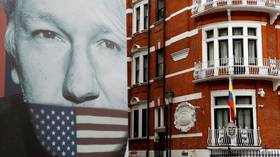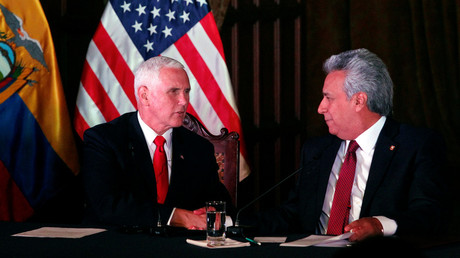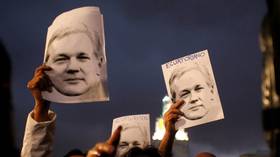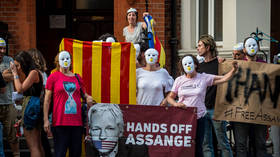Assange is a scapegoat, distraction for scandal-ridden Ecuadorian government
Published time: 11 Apr, 2019 09:32

As he faces a major corruption probe, Ecuadorian President Lenin Moreno is preparing to meet another demand from Washington by booting WikiLeaks journalist Julian Assange out of Ecuador’s embassy in London.
Times were different when the WikiLeaks founder walked into Ecuador’s London embassy seeking asylum in 2012.
Fearing that his native Australia wouldn’t protect him from extradition to the United States, where he faces imprisonment or even execution, Assange appealed to Ecuador’s then-president Rafael Correa to grant him refuge from “political persecution.”
Ecuador agreed, granting him asylum on the grounds that his “life, safety or personal integrity” could be compromised at any moment.
Having also kicked US troops off its soil just a few years earlier, the tiny South American nation’s gesture was applauded by many, including domestically.
Fast forward seven years, and now Ecuador is persecuting Assange and on the brink of handing him over for almost certain extradition, according to the country’s former consul general in London, Fidel Narvaez.
“The government of Lenin Moreno is doing everything to prepare the end of Julian Assange’s asylum,” Narvaez told me.
If delivered to British authorities, the Ecuadorian diplomat says Assange would likely be extradited to the US where “he will surely be sentenced to dozens of years of prison, at the least.”
For Narvaez, who was among the Ecuadorian officials who received Assange in 2012, the move is part of a return to a “subservient” foreign policy by the Ecuadorian government under Moreno.
“The foreign policy of the Ecuadorian government changed dramatically and it is now completely subservient to foreign pressures, especially from the US and the IMF, as it always was before the Citizen’s Revolution,” Narvaez adds.
Despite having been elected on a platform of continuing the leftist and nationalist policies of Rafael Correa’s Citizen’s Revolution, Moreno has actively attackedCorrea’s legacy as well as the governments that ascribed to ‘21st century socialism.’
In recent months, Moreno’s government has restored a controversial fly-overprogram in the country with the US military, and also participated in the creation of the right-wing-led Prosur bloc as a measure to dismantle the Union of South American Nations created by Correa and allies such as the late Hugo Chavez.
The Ecuadorian leader inked a $4.2 billion loan with the IMF, after spending months claiming Correa had driven the country into historic debt.
In light of these and other measures, Moreno’s seemingly imminent move against Assange isn’t surprising, but the timing of it is about more than just appeasing his allies.
“They want to use Julian Assange as a scapegoat to distract from the INA Papers scandal,” says Narvaez, referring to the allegations of corruption that have sullied Moreno, his family and other close associates.
The Ecuadorian president is facing a political investigation over accusations of money laundering through offshore accounts and shell companies in Panama, including the INA Investment Corp, of which Moreno’s brother was the registered owner.
Documents obtained by an opposition lawmaker, as well as damning images and documents circulating on social media that were apparently hacked from Moreno’s telephone, have irreparably tarnished his image and his credibility as anti-corruption campaigner.
Approval ratings for Moreno have since plummeted, and only 17 percent of Ecuadorians say they believe their president.
Predictably, his party was punished at the polls in the country’s recent municipalelections, losing two-thirds of the territories they won previously.
Risks of his impeachment are also growing.
Corruption investigation opened against Ecuador's president Moreno, after purported leaked contents of his iPhone (Whatsapp, Telegram) & Gmail were published. New York Times reported that Moreno tried to sell Assange to US for debt relief. https://t.co/0KFcBrnUfr— WikiLeaks (@wikileaks) March 25, 2019
In what can only be described as a desperate attempt to divert attention, Moreno and his officials accused Assange and WikiLeaks of orchestrating the scandal.
Communications Minister Andres Michelena went as far as to claim that Assange was colluding with Correa and Venezuelan President Nicolas Maduro to ‘destabilize’ Ecuador’s government.
The government submitted a complaint to the United Nations Rapporteur on Privacy accusing WikiLeaks of being responsible for the leak, and Moreno himself pointed to Assange, saying he had “violated the conditions of his asylum.”
Narvaez, who made headlines after issuing a“safe pass” for NSA leaker Edward Snowden to travel to Ecuador to seek political asylum in 2013, says Assange has not broken any rules and the claims are merely pretexts to end his asylum.
“Political asylum does not restrict rights, on the contrary, it should protect rights, and Julian Assange’s rights are being systematically violated by the government of Lenin Moreno.”
While he is obviously intent on giving Assange the boot, Moreno might still face a number of legal hurdles.
Assange has won favorable verdicts at the United Nations and the Inter-American Commission of Human Rights asserting his freedom, and he is no longer wanted for questioning in Sweden.
Moreover, Assange is now an Ecuadorian citizen, and the country’s constitution prohibits the government from allowing an Ecuadorian to be extradited.
Given the state of affairs in Ecuador, these might all just be formalities.
Impeachment or not, Moreno has long been rumored to be preparing an early exit and his right-wing allies appear poised to take over the helm in the Carondelet Palace.
Nevertheless, his crusade against Correa’s Citizen’s Revolution has meant a dismantling of institutions and regulations, coupled with austerity measures that have included massive public layoffs. The country finds itself spiraling towards the political instability and disarray that characterized the Andean nation during the 1990s and early 2000s, and therefore laws and process may be insufficient to stop the forced exit of Assange’s from Ecuador’s embassy.
Assange is trapped in this Kafkaesque scenario, surrounded by hostility, waiting for his adversaries to determine his fate.
By Pablo Vivanco
Pablo Vivanco is a journalist and analyst specializing in politics and history in the Americas, and served as the Director of teleSUR English. Recent bylines include The Jacobin, Asia Times, The Progressive and Truthout. Follow him on Twitter@pvivancoguzman
Think your friends would be interested? Share this story!
The statements, views and opinions expressed in this column are solely those of the author and do not necessarily represent those of RT.




0 Comments:
Post a Comment
Subscribe to Post Comments [Atom]
<< Home